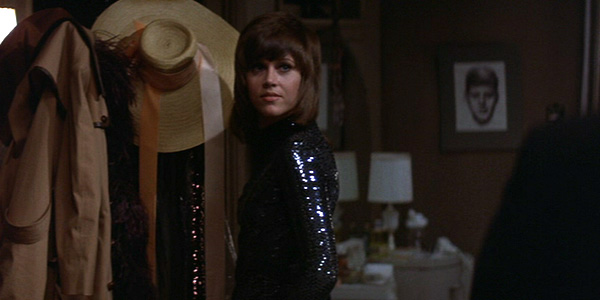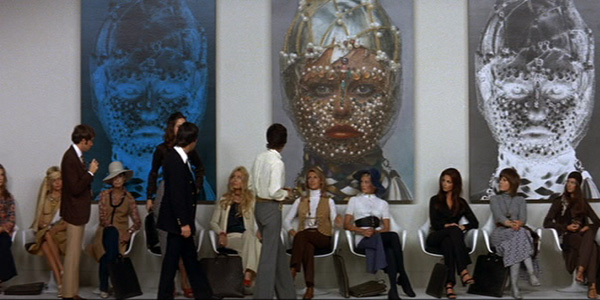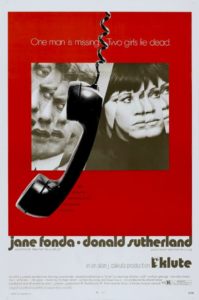|
Genres:
- Alan J. Pakula Films
- Detectives and Private Eyes
- Donald Sutherland Films
- Jane Fonda Films
- Mysterious Disappearance
- Prostitutes and Gigolos
- Roy Scheider Films
Response to Peary’s Review:
Peary refers to this psychological thriller by Alan J. Pakula as “exceptional”, pointing out Pakula’s “striking, highly atmospheric direction”, the inclusion of several “genuinely frightening” scenes, and Jane Fonda’s “remarkable” Oscar-winning performance. I agree with all of these assertions: Klute is effectively eerie in parts, gorgeously filmed by d.p. Gordon Willis, and contains one of Fonda’s best performances (Peary notes that “obviously she’s fascinated by Bree and wants to figure her out”). Unfortunately, however, the plot itself is needlessly confusing; while a second viewing helps to clarify exactly what’s going on, a really tight thriller shouldn’t require this. Yet the “murder mystery” ultimately could be seen as merely an elaborate MacGuffin, given that Klute is primarily concerned with exploring Bree’s life as a call girl, and the romantic relationship she slowly develops with Klute.
Indeed, many have noted that a more accurate title for the film would be Bree, given that she, rather than Klute, is really the central protagonist; Klute himself (Sutherland gives a mellow, restrained performance) is merely a catalyst in Bree’s well-ordered life — someone who subtly “convinces” her to open up emotionally to a man for the first time, and take a risk. Bree’s sessions with a psychotherapist (Vivian Nathan) — which were apparently semi-improvised by Fonda — are particularly revealing, and help us understand that Bree finds “her job liberating because she feels in control in her life only when turning tricks”; thus, her “movement toward real-life liberation takes a dramatic leap when she learns to trust Klute”. Fonda’s vulnerable, nuanced performance is the primary reason to watch this flawed but engaging and atmospheric film.
Redeeming Qualities and Moments:
- Jane Fonda as Bree Daniels (Peary, like the Academy, gives her an Alternate Oscar as Best Actress of the Year)

- Gordon Willis’s cinematography

Must See?
Yes, for Fonda’s Oscar-winning performance. Peary nominates it as one of the Best Pictures of the Year in his Alternate Oscars.
Categories
- Noteworthy Performance(s)
- Oscar Winner or Nominee
(Listed in 1001 Movies You Must See Before You Die)
Links:
|



One thought on “Klute (1971)”
Very much a must!
I fear I must disagree that a) “the plot itself is needlessly confusing”, and b) the film is “flawed”.
Though I’ve seen ‘Klute’ quite a few times (my first time at 16, at a drive-in), I hadn’t seen it in several years, until now. It continues to hold up remarkably well. Watching it now, I tried to erase previous viewings from my mind to see if, in fact, it *was* hard to follow or less than perfect. But what came back to me was my experience the first time round: that it is all of a piece and masterfully crafted.
Special mention, in fact, must be made of screenwriters Andy and Dave Lewis – who both worked in tv a lot but have only this as a major screen credit.
I don’t know that it would have helped the film by calling it ‘Bree’ instead of ‘Klute’. Doing so may have made Sutherland’s character something of a non-entity in a way – and I think it’s vital to emphasize (as the title does) the importance Klute has in Bree’s life, and vice versa.
I love the way the film unfolds; the scenes even before Fonda enters. The opening scene of the film does become creepier on a second viewing – perhaps the only scene that really *does* become creepier the second time around, because of what we know will happen later.
If the film has a flaw…to me, it’s the scene in which the character Arlyn Page is found. I find it hard to believe that the two main characters would have so little sympathy for Arlyn’s pathetic plea when they’re trying to get information out of her. BUT – the scene, flawed as it is, is there for a reason. I just wish it worked a little better. Still…a small gripe.
This really is Fonda’s show most of the way – and director Pakula is in full understanding of her and in full control of what surrounds her. Bree is among the most interesting and complex characters to emerge in a ’70s flick. You just want to go back and watch her again, and find more in her the next time. The performance is that good. …That said, tho…I still think Fonda should’ve gotten the Oscar for ‘They Shoot Horses…’ instead.